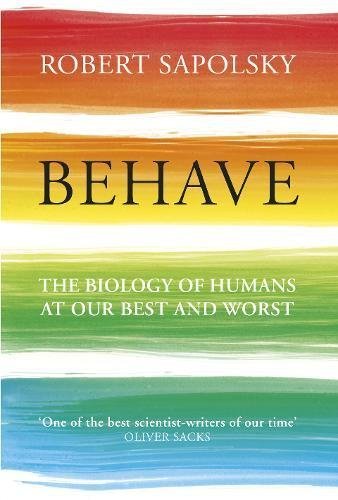Ammunition

Behave is a behemoth of a book. Unless you know quite a lot about neurobiology already, you’ll need to read the appendices: including those, it clocks in at seven-hundred and seventeen pages. You may well be familiar with longer reference books, or textbooks, or even novels, but this is a work of popular science – a genre that is usually scrupulous about making things as easy as possible for its readers. This volume is no exception: it is dense, and closely argued, but it is written in as light and inviting a style as could be imagined, and I can honestly say I can’t think of any way it could have been made shorter. Robert Sapolsky has some very important things to point out about human behaviour and the values attached to it, which would have been impossible to articulate without very carefully, step-by-step, taking us through pretty much all the things that rigorous scholarship has to say about the causes of said behaviour.
There would be little point in attempting to paraphrase Sapolsky’s account, but I think it’s fair to say that his central point is that behaviour, all behaviour, has causes, and that those causes are both material, and theoretically knowable. He spends the bulk of this book demonstrating this causality, beginning with the immediate neurochemistry that is deployed in any given act, and working gradually back through increasing biological timeframes, showing exactly what scientists have discovered about the ways that our behaviour is influenced by our neurochemistry and the other biological processes that feed into that. Eventually we get back to psychological, social and genetic evidence, and the evolution of our behaviour.
Sapolsky is a neurologist and a primatologist, which gives him a particular perspective, but he is at pains to draw on the knowledge of all the disciplines of scholarship that appear relevant. He spends a little time in his introduction explaining that he will try to avoid siloed, ‘categorical’ thinking, and for the most part he succeeds, although he seems to take some glee in pointing out how confused he is whenever anyone in the humanities uses technical language (‘hermeneutics’ is apparently a concept too far). However, he is to be commended for having grappled with a great deal of philosophical thinking, a wheel which many scientists mistakenly think can be readily re-invented as required. He’s weakest on history and politics (apparently Ian Paisley was ‘as bloody-handed a unionist as there was’ – he was a nasty piece of work, but he wasn’t a terrorist), but generally appears to have been pretty rigorous.
The essential observation that Sapolsky makes about human behaviour, is that it, and its causes, are complicated. Not just difficult to unpick, but impossible to break down to isolated factors. Nothing is determined by neurology, or genetics, or upbringing, or social conditioning; instead, every behaviour is caused at the intersection of multiple complex processes, all of which predispose towards particular outcomes, without guaranteeing them. Every behaviour, however is determined by these intersections: there are none that escape the networks of causality. And it is only once Sapolsky has presented a sufficient weight of evidence to make that case more or less indisputably, that he indulges in polemic.
In an excellent chapter on criminal justice he essentially demolishes the idea of morality as a basis for ethics. Our moral responses are as determined by biology as any, something he demonstrates at length, which makes them, he argues, a shaky basis for any code of rules or laws, but he argues further, that any inclination to pass moral judgement on human behaviour is invalidated by the observation that all of our behaviour is determined by complex processes outside of our conscious control. In fact, he goes on to dismantle the concept of free will, showing it to depend on the idea of a moral agent in control of our behaviour, that is quite outside the networks of causality he has spent so long describing.
He refers to this as a ‘homunculus’, and describes it largely in (facetious) technological terms, but this is what has been referred to for some millennia as a ‘soul’. Sapolsky denies the existence of any supernatural essence as the final arbiter of each human’s behaviour, and argues very clearly that such an essence is required to justify any moralistic account of right and wrong action. He argues for the complete replacement of the criminal justice system (specifically dismissing the possibility of reform), with something more like a public safety system, and for social codes of behaviour based on compassion and rational ethics.
There isn’t much in this book that was completely new to me, as I stay abreast of scientific research, and I have been arguing for the things that Sapolsky argues for, for most of my adult life. However, it is a remarkable work of synthesis, pulling together such a variety of threads, and weaving them into such a coherent picture of behaviour and its etiology, that it would be likely to give pause to the staunchest of moral conservatives, if they could be persuaded to read and understand it. But however much you already know, there is almost certainly a lot in here that you don’t (the mechanics of neurochemistry, in my case, in particular), and Sapolsky is an extremely sure-footed guide to unknown territories. His tone is a little flippant at times, but I guess he knows his audience, and chose to balance approachability against a sense of authoritativeness. For me, it’s a very validating volume, one that has helped me to expand and clarify my own thinking to an exceptional degree, and that will provide me with ammunition for years to come.